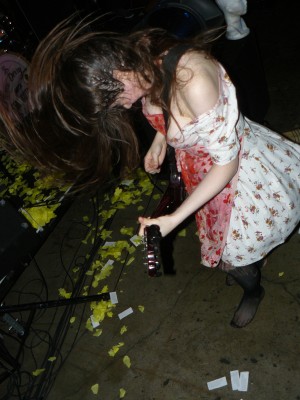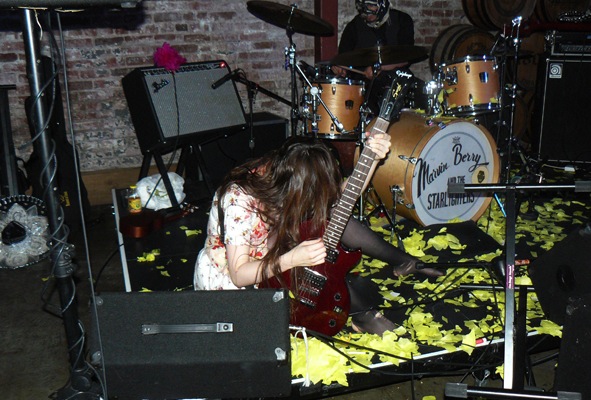Q&A: Le Butcherettes, Butcher Rock Diatribe

Teri Gender Bender and Le Butcherettes (“The Butcher Women,” essentially) aren’t the noms de guerre you’d instantly equate with charm and charisma. You might imagine instead a frontwoman who intimidates her audience into submission and a band that inspires its listeners to hold their ears. But Teri and her Guadalajara-based lineup are clearly costumed messengers, and they don’t mind tricking you into absorbing their hardcore, new-wave feminist agenda (their self-professed “butcher rock”) with fun and games.
We were lucky punks to witness the U.S. debut of a band we predict is going to set the hearts of riotless riot grrrls on fire, when they headlined the SF Convergence Fest preview party in June. Already underground royalty in Mexico, the band has opened for The Dead Weather and the Yeah Yeah Yeahs, but we had been slightly apprehensive: Le Butcherettes’ self-produced Kiss and Kill EP features very, very basic garage rock, and on record the songs can come off as somewhat predictable (excluding the anthemic “For Your Bleeding” and a couple of diamonds in the rough). So when Teri’s voice ripped through the crowd with a startling precision, intonation, and stylistic confidence difficult to achieve live – especially for punk bands – we nearly spit Corralejo all over ourselves.
We caught Le Butcherettes again opening for Omar Rodriguez-Lopez at the Great American Music Hall in downtown San Francisco. Fans of The Mars Volta guitarist’s progressive trip-rock were likely shocked out of their herbal haze by Le Butcherettes’ aggressively simple arrangements and bullet-direct delivery. While the headliner’s performance was note-perfect – thanks to the Mac laptops flanking the musicians – our focus, it seemed, had been ruined by Le Butcherettes, who tore through one two-minute rocket after the other, as Teri tore around the stage having an opera-worthy madscene. Dolled up in a crinoline-assisted dress straight out of a postwar dishwasher ad, torn stockings, and tying it all together with a blood-soaked apron, Teri Gender Bender looked like the doppelganger of the polite, hospitable young girl named Teri we’d sat down to chat with before the show:
______________________________________
What’s up with the meat onstage? We heard you were a vegan…
I am vegan! The real me probably wouldn’t want to handle raw meat, but there’s that connection between women and gender and “T&A” and meat that I want to illustrate.
_____________________________________________________________
“WE’RE SHOWING THAT THE
STRICT ROLES, THE GENDER ROLES,
ARE MEANINGLESS.”
_____________________________________________________________
You sing about the engendered violence of the recent onslaught of kidnappings in Mexico on Kiss and Kill. You grew up in the US before your family moved back to Guadalajara—did this move change your perspective on gender roles or the treatment of women?
I grew up in Denver, and I felt constantly oppressed there. So no, not much either way. There are people everywhere buying into the idea that women are worth less than men, or that men have to be a certain way.
How is performing at home different from performing in the states?
In Mexico, there’s still this idea of “the perfect rock band.” Male frontman, tough image, very traditional rock image. We were performing at the RockNexa festival, which is pretty huge, and a portion of the crowd started booing before they’d even really hear the first song…they just saw me.
 With the new LP, your sound seems to have grown. What aspect of the self-produced EP would you not repeat?The spoken-word stuff, probably. When I hear it I kinda think, “why did we do that?” It was totally in the moment, though. We paid this guy like $100 to record, and he suggested we try out just recording us talking, so I thought “why not,” and scribbled down a little script.
With the new LP, your sound seems to have grown. What aspect of the self-produced EP would you not repeat?The spoken-word stuff, probably. When I hear it I kinda think, “why did we do that?” It was totally in the moment, though. We paid this guy like $100 to record, and he suggested we try out just recording us talking, so I thought “why not,” and scribbled down a little script.
 …A decidedly female image. Does that have anything to do with your transforming Le Butcherettes from “girl band” to co-ed band?Really, there should be no boy bands or girl bands. But that’s what people saw. After Auryn [Jolene, former drummer] left, I thought, should I get another female drummer, and represent what we were representing before, the housewives, the female aspect of the family, or should I represent the full spectrum? Now Normandi [Heuxdaflo, drummer] completes the “nuclear family” onstage. We’re not making fun of nuclear families, but we’re showing that the strict roles, the gender roles, are meaningless.
…A decidedly female image. Does that have anything to do with your transforming Le Butcherettes from “girl band” to co-ed band?Really, there should be no boy bands or girl bands. But that’s what people saw. After Auryn [Jolene, former drummer] left, I thought, should I get another female drummer, and represent what we were representing before, the housewives, the female aspect of the family, or should I represent the full spectrum? Now Normandi [Heuxdaflo, drummer] completes the “nuclear family” onstage. We’re not making fun of nuclear families, but we’re showing that the strict roles, the gender roles, are meaningless.
